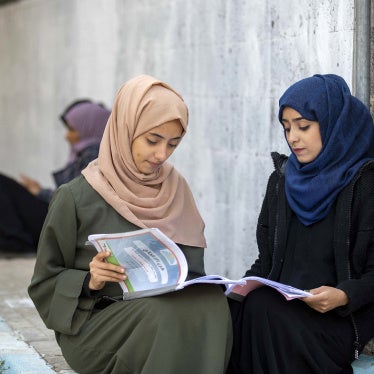Sussan Tahmasebi returned to her native Iran in 1999 for what she thought was a quick trip to reconnect with her roots, but she ended up staying for nearly 10 years, helping develop civil society to defend women’s rights.
She helped to start one of the most influential and effective human rights campaigns the country had ever seen. The One Million Signatures Campaign is a petition with a simple premise: Iran’s parliament should pass or change laws to allow equal rights in marriage, divorce, custody and inheritance. Its members pledged to approach ordinary Iranians in public places and to ask their fellow citizens to sign in the name of gender equality.
Tahmasebi and her colleagues purposely designed the campaign both to operate within the law and to be carried out without centralized leadership – making it more capable of withstanding government crackdowns.
“It was such a civil approach that we thought nobody should have a problem with it,” said Tahmasebi, an Iranian-American civil society activist who had worked for years on women’s issues in the United States before going to Iran.
When she arrived in Iran, Tahmasebi found a highly educated and engaged female populace. Iranian women had lost some important legal rights after the 1979 revolution. But she said she found that they’d also gained wider access to education, healthcare, and birth control.
“We have female doctors, we have politicians, MPs,” she said. “It’s paradoxical that, despite these achievements, discrimination against women is embedded in the legal system, and that lawmakers justify it by saying it's based in religion.”
Newly formed women’s groups were eager to make changes to the country’s discriminatory family laws, but were unsure how to do it. Tahmasebi worked with activist groups and together they developed agendas for reform. Mahmoud Ahmadinejad’s election in 2005 led to a narrowing of political space, forcing Tahmasebi and her colleagues to find novel ways to express their demands.
The One Million Signatures Campaign brings together women from multiple generations and from various backgrounds. Tahmasebi and her colleagues devised this broad, horizontal structure to ensure that a wide array of people could join as well as to withstanding government pressures.
They were quickly tested. Arrests began soon after the petition appeared in 2006. The media were ordered not to write about the group.
At one point, she and 32 women’s rights activists, many of them campaign members, were held in Evin Prison. But Tahmasebi said this only strengthened their resolve.
“You’re both creating change in the legal system and you’re trying to create change at a cultural level,” she said. “You know you have to pay a price.”
Behind the prison walls, the women had some success with the clear message of the campaign.
“Even our interrogators sometimes had a hard time resisting our demands,” Tahmasebi said. “They realized that these demands were so simple, and that Iranian women had achieved so much that society was ready for these demands.”
The crackdown has been severe, but the campaign has had some successes, in part because it elevated the discourse on women’s rights, engaging both Iranian policymakers and the public. There have been some changes, such as a law allowing women to inherit land from their husbands, and the requirement that insurance companies offer injured men and women equal rates of compensation.
But since the 2009 elections, which led to massive street protests in Iran, social activists have been targeted and some women’s rights activists have been arrested.
“This type of attack on women’s rights is unprecedented since the early days of the Iranian Revolution,” Tahmasebi said. “But I’m proud that, despite these difficult times, women activists continue to press for change and for cultural awareness about women’s rights.”



